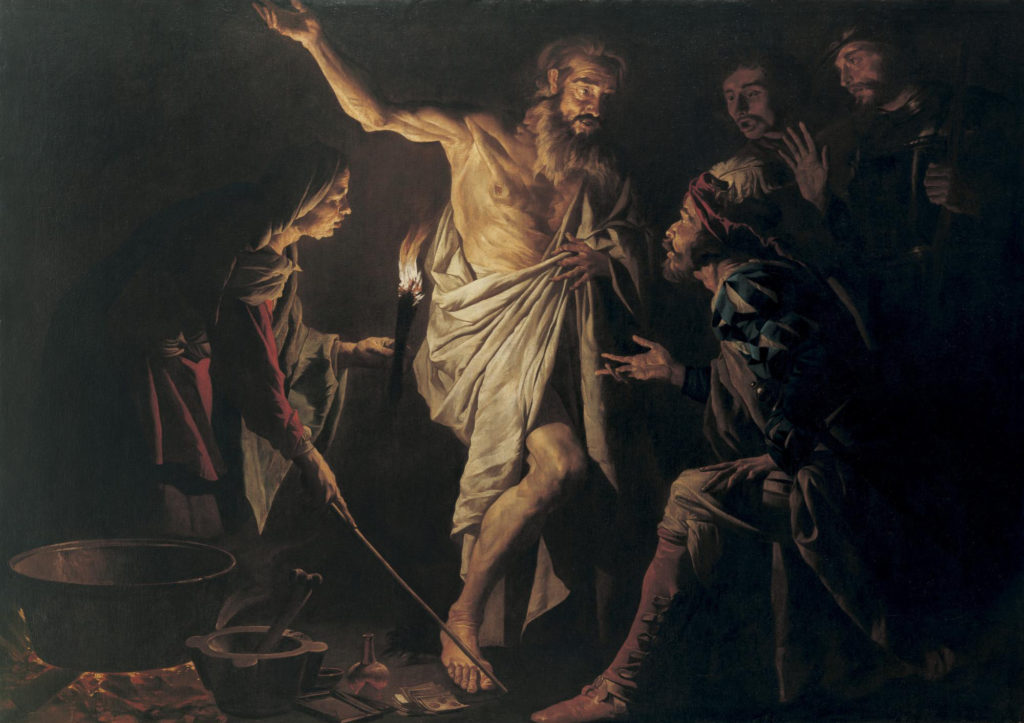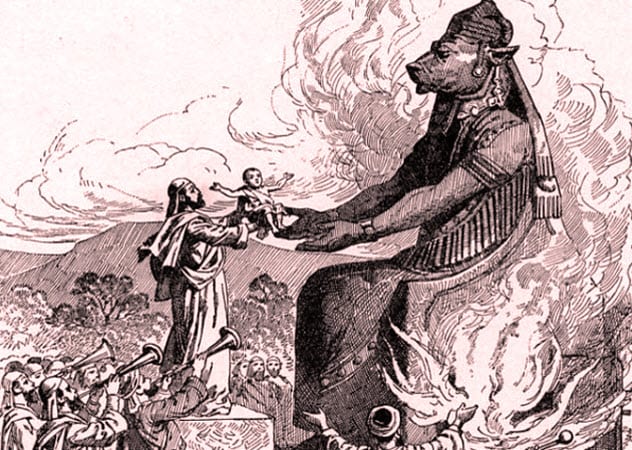‘When you come into the land that the LORD your God is giving you, you shall not learn to follow the abominable practices of those nations.’ (Deut.18:9)
In our world, that is routinely given to abominable practices, this passage in Deuteronomy seems quaint, of a less enlightened time, some would say offensive. It is only quaint because they cannot see themselves repeating the offences, the abominable practices, of the past, offensive because they don’t want to look into the mirror of the past. The late American journalist Sydney J Harris said, ‘History repeats itself, but in such cunning disguise that we never detect the resemblance until the damage is done.’
The Saviour
Several things might be said about God’s instruction to Israel through Moses, for that is what Deuteronomy is. They are about to come into the inheritance God had long promised them since the days of Abraham, Isaac, and Jacob.
We see it is a gift to them, as we find earlier in Moses’ exposition of the covenant:
‘And when the LORD your God brings you into the land that he swore to give to your fathers, to Abraham, to Isaac, and to Jacob, to give you-with great and good cities that you did not build, and houses full of good things that you did not fill, and cisterns that you did not dig, and vineyards and olive trees that you did not plant-and when you rest and are full, then take care lest you forget the LORD, who brought you out of the land of Egypt, out of the house of slavery.’ (Deut.6:10-13)
If we left it there we might stop and celebrate, marvel ,at the great generosity of God that he should be so scandalously bountiful to a people who can hardly claim to be deserving of such bounty.
The abominable practices of our title are listed, and Israel are reminded that God was driving out the people because they had long practised these detestable things:
’There shall not be found among you anyone who burns his son or daughter as an offering, anyone who practises divination or tells fortunes or interprets omens, or a sorcerer, or a charmer or a medium or a necromancer or one who inquires after the dead, for whoever does these things is an abomination to the LORD. And because of these abominations the LORD your God is driving them out before you. You shall be blameless before the LORD your God, for these nations, which you are about to disposes, listen to fortune-tellers and to diviners. But as for you, the LORD your God has not allowed you to do this.’ (Deut.18:10-14)
The Covenant People of God
It is important here to recognise God is not simply a Dutch Uncle, handing out stern advice with his bounty. These people of the Exodus entered into a covenant relationship with the God who brought them out of the house of slavery:
‘The LORD called to him out of the mountain, saying, ‘Thus you shall say to the house of Jacob, and tell the people of Israel: You yourselves have seen what I did to the Egyptians, and how I bore you on eagle’s wings and brought you to myself. Now therefore, if you will indeed obey my voice and keep my covenant, you shall be my treasured possession among all the peoples, for all the earth is mine, and you shall be to me a kingdom of priests and a holy nation.’ These are the words that you shall speak to the people of Israel.’ (Ex.19:3-6)
There is a solemn and holy relationship that precludes other gods, rejects foreign and detestable ways, and that includes obedience, loyalty, and holiness as a nation. God, through Moses, anticipates the temptations Israel will face if they enter the land with anything less than a wholehearted commitment to the God who saved them and brought them to himself, made them his treasured possession.
Abominable Practices, Detestable Things
Yet, not so many generations later, Israel rejected God their king, agitating to have ‘a king like other nations.’ Twice in 1 Samuel 8 Israel clamoured to be ‘like other nations.’ As Samuel made clear his displeasure at such disloyalty, God said, ‘Obey the voice of the people in all that they say to you, for they have not rejected you, but they have rejected me from being king over them.’ (1 Sam.8:7)

Rejected in favour of David, Saul finally turned to a medium in the village of Endor, a detestable thing in the eyes of the LORD
The king God gave them, Saul (11th century BC), started so well, yet proved not to be a man after God’s own heart, ruling on his own initiative, failing to fully recognise the role of the prophet, depending on his own judgement, and finally proving disobedient to God’s instructions. Rejected in favour of David, he finally turned to a medium in the village of Endor, a detestable thing in the eyes of the LORD, to summon up the spirit of the now deceased Samuel. To the amazement even of the medium Samuel appeared and issued a final judgement on Saul, ‘The LORD has turned on you and become your enemy…’ (1 Sam.28:13-19)
In Hosea, in the 8th century BC, we have a record of outright disobedience among God’s people. Apostasy is rampant, the people having turned wholesale from God. The kings, the aristocracy, and the priests turned away from God’s law to abominable practices, to worshipping foreign gods, including Baal, the Canaanite storm god, and Ashera, a Canaanite fertility god. It was these Canaanite gods who demanded worship through sexual sin, even calling, in extreme circumstances, for child sacrifice. Abominable things indeed.

It was these Canaanite gods who demanded worship through sexual sin, calling, in extreme circumstances, for child sacrifice. Abominable things.
Hosea is a record of homicide, perjury, theft, and sexual sin. The prophet doesn’t hold back in his condemnation and his is a record of a saved people completely falling away from the God who saved them:
‘Hear the word of the LORD, O children of Israel…there is no faithfulness or steadfast love, and no knowledge of God in the land; there is swearing, lying, murder, stealing, and committing adultery; they break all bounds, and bloodshed follows bloodshed.’ (Hosea 4:1,2)
In response God declared:
‘Rejoice not, O Israel, Exult not like the peoples; for you have played the whore, forsaking your God. You have loved a prostitutes wages on all the threshing floors. Threshing floor and wine vat shall not feed them, and the new wine shall fail them. They shall not remain in the Land of the LORD.’ Hosea 9:103)
It is in Hosea 8:7 we find the familiar phrase, ‘Sow the wind, reap the whirlwind.’
The Saviour
It is so tempting today to look at this condemnation of a nation, shake our heads, and bring that same condemnation on the world around us. It is surely true that,…’there is no knowledge of God in the land; there is swearing, lying, murder, stealing, and committing adultery; they break all bounds, and bloodshed follows bloodshed.’ But that is not my theme.
If you are a Christian today you have a Saviour, the same God of Israel, who bought you out of your slavery to the boundless sinfulness of the world, brought you to himself, and made you one of a covenant people, a treasured possession; ‘You were bought with a price.’ (1 Cor.6:20) Just as the Old Testament people of God were brought out of the house of slavery to enter into a covenant relationship with the living God, so we too are called out of the house of slavery into a covenant relationship with him.
Just as Israel were saved when they were least able to help themselves, so we have been, ‘saved by grace, through faith…it is a gift from God.’ (Eph.2:8)
The Covenant People of God
Israel were brought to the mountain and entered into a covenant relationship with God, ‘But you have come to Mount Zion and to the city of the living God, the heavenly Jerusalem, and to myriads of angels, to the general assembly and church of the firstborn who are enrolled in heaven, and to God, the Judge of all, and to the spirits of the righteous made perfect, and to Jesus, the mediator of a new covenant, and to the sprinkled blood, which speaks better than the blood of Abel.’ (Heb.12:18-24)

Baptised into his death, raised in newness of life.
Paul writes, ‘all of us who were baptised into Christ Jesus were baptised into his death.We were buried therefore with him by baptism into death, in order that, just as Christ was raised from the dead by the glory of the Father, we too might walk in newness of life.’ (Ro.6:3) He goes on to write, ‘consider yourselves dead to sin and alive to God in Christ Jesus.’ (6:11)
Peter reminds us this is all to a purpose, ‘You are a chosen race, a royal priesthood, a holy nation, a people for his own possession, that you may proclaim the excellencies of him who called you out of darkness into his marvellous light. Once you were not a people, but now you are God’s people; once you had not received mercy, but now you have received mercy.’ (1 Pet.2:9,10)
How are we squaring up as a people of God these days? As a ministry to the cults, the local church is key to what Reachout Trust does. We try so very hard to find for people a safe spiritual home as they come to terms with what has happened to them, try to sort out their doctrine and practise. How is your church doing right now?
The early church is best described in Acts:
‘They devoted themselves to the apostles’ teaching and the fellowship, to the breaking of bread and the prayers.’ (Acts 2:42) Luke goes on to describe a church awestruck by the work of God among them, gladly sharing the common life, meeting and breaking bread with glad and generous hearts, praising God.
Abominable Practices?
Are we doing any better than the people of God in the Old Testament? Are there abominable practices, detestable things, among us? We know that, from the start, the church has had to ‘contend for the faith once for all delivered to the saints’ (Jude 3) and, at Reachout, we take this charge seriously. Paul urged Timothy to, ‘fight the good fight for the faith’ (1 Tim.6:12).
That whole section of 1 Timothy 6:3-12 is worth reading again to remind ourselves of the imperative nature of the call. So, how is your church doing?
I hear so many church leaders, and members, bemoan the absence of a robust discipleship in the church. ‘How is your walk with God today?’ When were you last asked that question, or something like it? When did you last ask it as a leader? Or do you take it for granted if they turn up they must be alright, know what’s what?
If you were asked that question, would you take it as an intrusion, an offence? When did our faith become, as it has for so many, a private affair between me and God? A private faith is a faith lacking true devotion, fellowship, the common life, and ultimately direction; the very opposite of biblical church.
When an unbeliever decides to finally grasp the nettle and, for the first time perhaps, step across the threshold of your church, what will they see? This is a picture I often use to make a serious point. As a visitor comes through the door of your church which way are they facing? What have they turned their back on? What might their expectations be? What if they find the abominable things of the world, on which they have turned their back, in the church? Spurgeon had something to say about this:
“If we add to our Churches by becoming worldly, by taking in persons who have never been born again; if we add to our Churches by accommodating the life of the Christian to the life of the worldling, our increase is worth nothing at all; it is a loss rather than a gain! If we add to our Churches by excitement, by making appeals to the passions rather than by explaining the truth of God to the understanding. If we add to our churches otherwise than by the power of the Spirit of God making men new creatures in Christ Jesus, the increase is of no worth whatever!”–1892, Sermon 2265”
Does your church preach the whole counsel of God from the whole word of God? Or does it appeal to proof texts to build a shallow apologetic for what is currently fashionable? Is your Sunday morning marked by a diet of sound doctrine, the meat of the gospel, that sends you away challenged, repentant, resolved? Or is your Sunday morning marked by little more than a comfortable TED talk that adds to your general knowledge but nothing to your stature as a mature Christian?
I have wondered how ancient Israel came to be so like their neighbours. How does a people go from being holy, with a priesthood that sacrifices correctly and vicariously to a loving God, to a pagan priesthood that sacrifices children? How from a high command ‘to act justly love mercy and to walk humbly before God’ (Micah 6:8), to swearing, lying, murder, stealing, and committing adultery, breaking all bounds, bloodshed following bloodshed?
I’ll wager it didn’t start with,’Sacrificing children? That’s a good idea!’ It started with the loss of a sense of community, of being accountable to and for each other, a failure of leadership and an absence of discipleship. It proceeded through a privatisation of religion, the adoption of family gods, a very popular idea now as then; have you ever heard someone say, ’my Jesus is like this, or that?’ or ‘My God would or wouldn’t…?’ How many today get their religion off the Internet, shopping for a god?
A privatised religion defines itself, shapes itself in its own image, which is usually in the world’s image. While the church busies itself with endless rounds of programmes and initiatives that are bound to work here since they worked elsewhere, its members cast about for ideas to make up for a troubling deficiency.
So, there grows an idle interest in the unfamiliar, the esoteric, an introduction to a ‘good idea’ in a conversation with a neighbour, a fading away of trust in God. It continues with a neglect of Gods too familiar, demanding word, and an interest in what’s going on ‘over there’; chasing the blessing. Perhaps a set back drives a search for a solution, a friend suggest an answer in a foreign god, therapy, or practice. It’s a slippery slope and we should examine ourselves to see whether we are in the faith (2 Cor.13:5)
This way we come to believe in anything but God, giving it the name ‘Christian’ yet being anything but biblical. The Israelites wrestled with the idea they could possibly prosper in the settled farming setting of Canaan, after following their God of the desert, unless they paid some homage to the god of that place. So today we look too easily to the gods of the prevailing culture believing our God may not be altogether up to the pace of our modern world.
So we see strange and ungodly doctrines and practices coming into the church, entering among the people of God.
The errors of Modern Christian Mysticism are rife across the church today. Modern mysticism comes recently in the form of the Enneagram. Don’t be fooled, it is not a personality test, neither is it ancient, it certainly isn’t biblical. If you have never heard of it God bless you in that, but you may well at some point, and if you do don’t touch it. See this article by Tony Brown for helpful insights into the New Age in the church.
Modern sacrifices for fruitful living just like those sacrifices to fertility gods for good crops (sow your seed money and God will bless you 100-fold).
Adultery, which is rife in parts of the church today, especially among celebrity ‘pastors’ who have never pastored anyone in their lives, and are so obviously narcissistic they need pastoring themselves.
False prophets abound, coming straight into our living rooms via the Internet, telling lies about their day trips to heaven to chat to their best friend Jesus, making predictions that fail dramatically, only to come back with more that further fail, yet people still follow.
The acceptance in liberal church circles of any and all sorts of relationship, ‘as long as there is love,’ demonstrating they have completely redefined biblical love as romantic love instead of agape’ love.
A focus on unity over fidelity to God’s word, leading to the blurring of lines between the church, the cults, and even other religions. Syncretism and multi-faith are destroying parts of the community of faith.
A focus on serving the community over and against faithfully teaching the truth, based on the wrong-headed notion that if we are nice to people they will like us. The truth is, if they like us that much we are doing something very wrong; ‘If you were of the world, the world would love you as its own; but because you are not of the world, but I chose you out of the world, therefore the world hates you.’ (John 15:19)
Churches becoming concert venues, congregations becoming audiences, leaders becoming celebrities, services becoming entertainment, and the Bible picked up only to give an illusion of orthodoxy, to proof text the empty nonsense coming from the ‘stage.’
The Call
There is a call in Jeremiah to, ‘stand by the roads, and look, and ask for the ancient paths, where the good way is; and walk in it, and find rest for your souls,’ but the people of Jeremiah’s day said, ‘we will not walk in it.’ (Jer.5:16)
God said, ‘I set watchmen over you, saying, ‘Pay attention to the sound of the trumpet!’ But the people said, ‘We will not pay attention.’ (v17) The consequences for the people of God were disastrous, as you will see if you read on in Jeremiah.
The trumpet is sounding today in so many quarters, and I thank God for those faithful and vigilant souls giving that clear warning. As a ministry Reachout regards the local church as essential in what we do. The church, which is so important the Bible tells us, ‘Christ loved the church and gave himself for her.’ (Eph.5:25) What about your church, how are you faring these days? Do you share these concerns? Do you hear the trumpet call? How will you respond?
I pray God will bless you as you find and follow his paths, and if you want to talk about these things we are here for you. If you want us to come and speak to your church about these things, or about the broader issue of the cults, we would be glad to hear from you.
Let us, ‘press on toward the goal for the prize of the upward call of God in Christ Jesus.’ (Philip.3:14)

